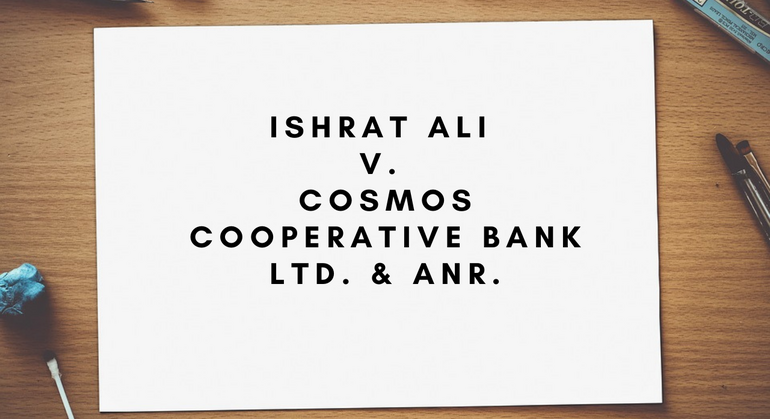

Ishrat Ali v. Cosmos Cooperative Bank Ltd. & Anr.
M/s. Cosmos Co-Operative Bank Limited-(Financial Creditor) filed an application under Section 7 of the Code for initiation of the CIRP against Micro Dynamics Private Limited-(Corporate Debtor). The Adjudicating Authority (NCLT), Mumbai Bench, Mumbai, by the impugned order dated 23rd September 2019 admitted the application. The Appellant, Director, and Shareholder of the Corporate Debtor challenged the impugned order on the ground that the application under Section 7 was barred by limitation.
Learned counsel for the Respondents appeared and relied on the judgment of this Appellate Tribunal in “Sesh Nath Singh & Ors. v. Baidyabati Sheoraphuli Cooperative Bank Ltd. In the said Judgment, a Bench of three Hon’ble Members of this Appellate Tribunal held that the Financial Creditor bonafide prosecuted his application under SARFAESI Act, 2002 and therefore, in accordance with Section 14(2) of the Limitation Act, 1963 in computing the period of limitation the time during which the Respondent has been prosecuting with due diligence another civil proceedings against the Corporate Debtor for the same relief shall be excluded.
Issues
The primary issues under this case were the following as under :
- Whether the action taken by a financial institution under Section 13(4) of the Securitisation and Reconstruction of Financial Assets and Enforcement of Security Interest Act (SARFAESI) is a proceeding before a court of law or before a Tribunal?
- If an application is filed before the Debt Recovery Tribunal (DRT) against such action in terms of the Securitisation and Reconstruction of Financial Assets and Enforcement of Security Interest Act (SARFAESI Act) 2002, whether it can be held to be a proceeding moved before a wrong forum for computing the period of limitation under Section 14(2) of the Limitation Act?
- Whether the Securitisation and Reconstruction of Financial Assets and Enforcement of Security Interest Act (SARFAESI) and Debt Recovery Tribunal (DRT) proceedings extend the period of limitation for filing the Section 7 and 9 applications under the Insolvency and Bankruptcy Code (IBC)?
Judgment
A suit for recovery of money can be filed only when there is a default of dues. Even if the decree is passed, the date of default does not shift forward to the date of decree or date of payment for execution. The decree can be executed within a specified period i.e. Twelve years. If it is executable within the period of limitation, one cannot allege that there is the payment of dues or default of decree. Therefore, National Company Law Appellate Tribunal (NCLAT) held that a decree or Judgment passed by a Court for recovery of money by Civil Court or Debt Recovery Tribunal cannot shift forward the date of default for the purpose of computing the period for filing an application under Section 7 of the Code.
The Limitation Act, 1963 under section 14(2) makes it clear that in computing the period of limitation for any application, the time during which the applicant has been prosecuting with due diligence another civil proceeding, whether in a court of the first instance or revision or appeal, against the same party for the same relief shall be excluded, where such proceeding is prosecuted in good faith in a court which, from the defect of jurisdiction or other cause of a like nature, is not able to entertain it. Therefore, to take advantage of Section 14(2), the Applicant must satisfy:
- That the applicant has been prosecuting with due diligence in another civil proceeding, whether in a court of the first instance or of appeal or revision.
- against the same party; and
- for the same relief.
Under the Securitisation and Reconstruction of Financial Assets and Enforcement of Security Interest (SARFAESI) Act, 2002, once the account is declared as Non-Performing Asset (NPA), the Financial Creditor can exercise its power under Section 13 of the Securitisation and Reconstruction of Financial Assets and Enforcement of Security Interest (SARFAESI) Act, 2002 which is required to issue Demand Notice under Section 13(2). An action was taken by the Financial Creditor under Section 13(4) or Section 13(2) of the SARFAESI Act, 2002 cannot be termed to be a civil proceeding before a Court of the first instance or revision or of appeal before an Appellate Court and the other forum. Therefore, the action is taken under Section 13(2) of the Securitisation and Reconstruction of Financial Assets and Enforcement of Security Interest (SARFAESI) Act, 2002 cannot be counted for the purpose of exclusion of the period of limitation under Section 14(2) of the Limitation Act, 1963.
In an application under Section 7 relief is sought for resolution of a Corporate Debtor or liquidation on failure. It is not an amount of claim or suit. Therefore, no advantage can be given to any person under Section 14(2), till it is shown that the application under Section 7 was prosecuting with due diligence in a court of the first instance or revision or of appeal which has no jurisdiction.
The decision rendered in “Sesh Nath Singh & Ors. v. Baidyabati Sheoraphuli Cooperative Bank Ltd.” thereby cannot be held to be a correct law laid down by the Bench.
In the present case, the account of the Corporate Debtor was classified as Non-Performing Asset (NPA) on 30th March 2014. Thereafter, on 6th December 2014, Demand Notice under Section 13(2) of the SARFAESI Act, 2002 was issued by the Respondent- Cosmos Co-operative Bank Ltd. The Bank also initiated Arbitration under Section 84 of the Multi-State Cooperative Societies Act on 4th December 2015. The Bank had also taken possession of the movable assets under Section 13(4) of the SARFAESI Act, 2002 as back as on 16th January 2017. In the circumstances, instead of remitting the case to the Bench, National Company Law Appellate Tribunal (NCLAT) held that application under Section 7 filed by the Cosmos Co- Operative Bank Limited was barred by limitation. Consequently, set aside the impugned order dated 23rd September 2019 passed by the Adjudicating Authority, National Company Law Tribunal (NCLT), Mumbai Bench, Mumbai.



